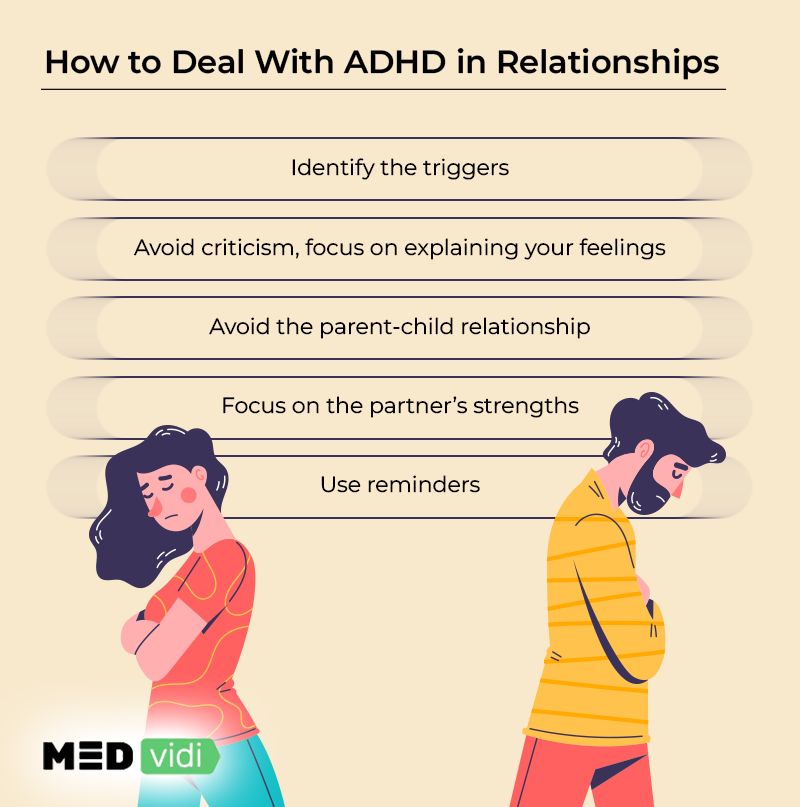How does ADHD affect relationships? Some studies show that marriages where one of the partners has ADHD are
Some couples have discovered the secret to enjoying long-term relationships despite the condition. We’ll share those secrets with you. But first, let’s see how untreated ADHD in adults may affect relationships.
ADHD symptoms can be managed with the help of the right medications or psychotherapy.
ADHD and Relationships
If one of the partners has ADHD, relationships might sometimes have more problems than usual. One of the
Partners may start fighting over petty issues. Unfortunately, impulsivity makes it hard to think before acting. In some cases, anger outbursts may appear together with yelling. Such reactions escalate the problems instead of resolving them.
A couple’s challenges can also appear because a person with a condition and the one without it don’t understand each other. Each person thinks they’re right, and the other one is wrong due to the difference in perception. To get a better understanding, let’s have a look at how people in such couples feel.
How the Partner of an ADHD Person Feels
If you’re dating someone with ADHD, you might sometimes wonder if your partner loves you. That’s because their mood may shift every so often. One day you get showers of love, and the next day, they’re not in the mood for anything. Some annoying things a partner struggling with ADHD can do include:
- Forgetting to pay bills on time, which can create serious inconveniences.
- Being inattentive when you’re speaking to them, making you repeat the same thing quite often.
- Inability to complete chores on time.
- Failing to keep the house organized.
As the responsible partner, you may have to do most of the work at home. When you do everything, you’ll feel overwhelmed, and that will cause frequent fights with your partner. Here’s how the relationship can make you feel:
- Feeling neglected when your partner doesn’t seem to pay attention to you.
- Feeling like you’re walking on eggshells because anything you say or do might trigger an overreaction from your partner.
- Having to clean after your partner’s mess.
- Feeling like you have to do everything yourself as the responsible partner.
How an ADHD Person Feels
ADHD and romantic relationships can be exciting at first. When you meet a new person, your attention increases because the relationship functions as a dopamine boost. But as the relationship progresses, the excitement you had starts to fade. Your partner notices the negative qualities and becomes concerned.
If they don’t know you have ADHD, they’ll think you’re doing things deliberately and try to control you. Consequently, you might feel micromanaged and misunderstood. Boredom will set in, and the initial spark you felt in your relationship will disappear as you lose hyperfocus.
When some people with ADHD reach this level, they look for ways to exit the relationship. Some cheat on their partners, and others start nagging them. Eventually, they cut down communication, create emotional distance, and lose interest in the intimate relationship. The person with ADHD may jump from one relationship to another in search of another dopamine boost.
ADHD comes in different forms. We know how to help you set the right ADHD treatment goals to manage the symptoms that hamper your life the most.
How to Deal with ADHD in Relationships
Even though ADHD and marriage can be challenging, it’s not a reason to leave your partner. Many couples have endured despite the condition. What’s their secret? They didn’t work harder; they worked smarter. It’s about understanding the problem.
After the diagnosis, you’ll understand why you behave in certain ways. Your partner will become more compassionate because they’ll realize you don’t make mistakes deliberately. ADHD will become the new enemy, not your partner. From there on, you can work together to find solutions.
Here’s
- Avoid criticism. Instead of criticizing your partner, explain how their behavior affects you. When an argument sets in, leave your partner to calm down. Settle the dispute later when they’re not angry.
- Avoid the parent-child relationship. Both partners in a marriage are adults. Avoid giving directions as a parent does to a kid. That will make your partner feel micromanaged and start rebelling.
- Identify the triggers. Identify what triggers a bad reaction from your partner and avoid it or find your way around it. Similarly, identify what triggers a good mood and do it.
- Focus on their strength. Despite the ADHD condition, there’s something that draws you to your partner. The reason you chose to be with them. Focus on that, along with any positive qualities they possess. Offer commendations occasionally based on their strengths.
- Use reminders. To avoid forgetting important things, write them down and put the reminder where you’ll see them.
Consult a licensed MD in your state and get a personalized treatment plan: therapy via telemedicine services, online prescriptions, and ongoing support.

Conclusion
Strong relationships require each partner to be dependable and available when needed. You might feel as if your partner with ADHD is unpredictable at times. That’s what makes relationships with ADHD people more challenging. But understanding ADHD and how it affects their personality can help a lot. You’ll start showing compassion and be more supportive.
And if you’re the one with ADHD, work together with your partner to find solutions. Acknowledge you have a problem and seek medical help. Medication can help reduce ADHD symptoms, and counseling can provide a long-term solution on how to control your behavior.
Struggling with ADHD and marriage? Reach out to us for professional assistance.













